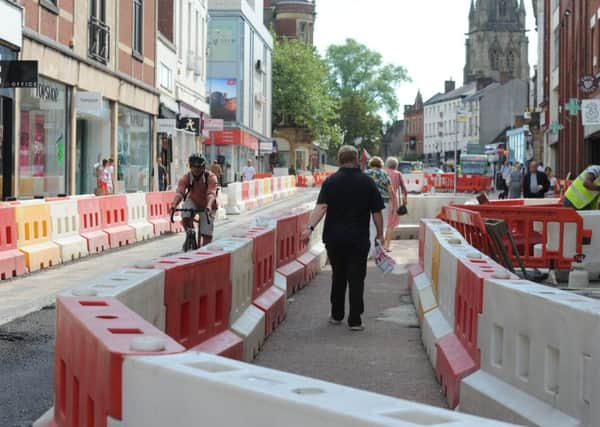Calls for halt to ‘shared space’ schemes like Preston’s Fishergate development


The news comes as construction of the second phase of Preston’s Fishergate Central Gateway project is well underway.
The controversial “free-for-alls” which mix traffic and pedestrians have been criticised in a survey by Lord Holmes of Richmond.
Advertisement
Hide AdAdvertisement
Hide AdThe former Paralympian, who is blind, sought the views of 600 people, 62 per cent of whom rated their experience of using shared spaces as poor.
He has now called for an immediate moratorium on what he described as “these dangerous and costly planning follies.”
His report found more than a third of people actively avoided shared spaces and there was a significant under-reporting of accidents in such areas.
“An immediate moratorium on all shared space is absolutely essential,” he said. “I hope that this survey will act as a wake-up call to all involved in these dangerous and costly planning follies.
Advertisement
Hide AdAdvertisement
Hide Ad“Town centres are being turned into dangerous third-world traffic free-for-alls.”
Shared spaces, like the one in Preston, have been criticised for increasing the chance of accidents.
Lord Holmes believes the results of the survey clearly demonstrate that these schemes do not “improve pedestrian movement and comfort” and “enable all users to share the space”.
Shared spaces are also facing a legal challenge, with solicitor Chris Fry from Unity Law representing five visually impaired people who are suing the local authorities responsible for shared spaces.
Advertisement
Hide AdAdvertisement
Hide AdHe said: “The idea is that pedestrians will make eye contact with drivers and that will lead to greater safety.
“But the visually impaired cannot do that and local authorities are in breach of their duty as service providers under the Equality Act to make reasonable adjustments to the shared space.”
John Fillis, Lancashire County Council cabinet member for highways and transport, said: “There are many types of shared space scheme across the country and here in Lancashire we learned from others’ experience and consulted with disabled groups at an early stage to ensure the Fishergate Central scheme meets everyone’s needs as far as possible.
“At the design stage we responded to feedback from visually impaired people by making the kerbs slightly bigger so they could be more easily detected by cane users and used contrasting coloured granite to mark out the kerb from the rest of the surface.
Advertisement
Hide AdAdvertisement
Hide Ad“Other aspects of the design have clear benefits for people with visual impairments. The wider pavements mean there is more space and fewer signs and less street furniture have reduced clutter. Wheelchair and scooter users can also cross more easily as we’ve introduced more crossing points.
“We’ve continued to listen to feedback, with the result that the loading bays in the second phase of the scheme will be easier for visually impaired to see as we’re using more contrasting stone to construct them.”